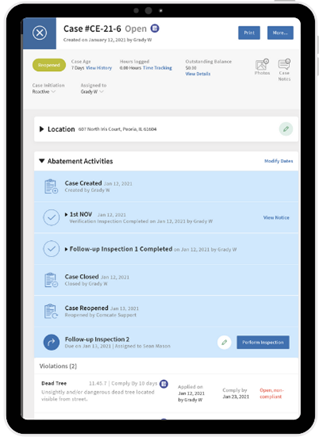City of Florence, KY Increases Code Enforcement Capacity by 52% with Purpose-Built Software
In 2020, the City of Florence, KY said goodbye to its outdated code enforcement software and implemented Code Enforcement Manager (CEM) by Comcate. The City’s old solution was part of a suite of products that included asset management. In modernizing its systems, the City chose best-of-breed solutions that could speak to one another.
The goal was to help the City’s code enforcement officers be more efficient. On average, the department manages about 2,500 code cases a year. After launching CEM, that number jumped up to 3,800 cases. A 52% increase for this city of 32,000. Comcate sat down with Jeremy Kleier, Community Services Superintendent, to learn more.
Community Services Superintendent, Jeremy Kleier, shares the City of Florence, KY’s Code Enforcement modernization journey.
What problem was the City of Florence trying to solve?
We were using software that started out as GBA, then became Lucity, and is now CentralSquare. We started using it back in 1999 to do all our request tracking, work orders, and asset tracking. It worked okay for code enforcement, but it wasn’t made for code enforcement. We were making do.
What code enforcement functionality was missing?
We couldn’t generate notices with the software. It was not good on mobile [devices]. It did not use GIS information. And over the years we had to customize it a lot in order to track fines and citations. It was time to find something new.
Why now?
We plugged along for nearly 20 years. And then we set out to find a new asset management system. When we first went into the process, we were looking for software that would handle asset management, work orders, and code enforcement all together. But we couldn’t find it. So we decided to split code enforcement out and picked Cartegraph for asset management.
Code Enforcement Manager is purpose-built to help officers optimize their efficiency across enforcement initiatives.
What was your selection process like?
When we realized Cartegraph wasn’t going to meet our code enforcement needs, we got together with the code enforcement staff and started researching options. I brought the list we created to our GIS manager in order to evaluate the technical side of things, to make sure it was going to jive with [existing systems]. We whittled that list down to four vendors and scheduled demos.
Why Comcate?
We had a list of important things we were looking for that our old system couldn’t do. And Comcate took care of them all. We were looking for the ability to generate notices to track fines, time tracking for staff, GIS mapping, image attachments, and overall case tracking. We wanted the ability to put an alert on a property so if [the property owner] had a dangerous dog, for example, the code officers would be aware of it. We also wanted the ability to track multiple citations on one case. The way our old system worked we could only track one citation per case record.
Generate formatted notices in the field and print them with a mobile printer or back in the office.
How did integrations factor in?
Integrations were also a big concern for us. We needed something to integrate with our Rock Solid customer portal. We also needed something to integrate with Cartegraph since we knew we were moving in that direction. And we wanted to import all the old Lucity data into the new system. Finally, we wanted something that worked seamlessly from a desktop computer in the office to an iPad out in the field.
What were the must-have features for your code enforcement officers?
What it came down to was efficiency. The way we used to do things, we would have to research the property’s ownership and then type up our own notices that we’d then save in a paper file. Comcate has really increased our efficiency by automatically populating ownership information, giving us the ability to generate notices in the field, and having an electronic record of everything; letters, citations, and pictures attached to the case record. This was all huge for us.
How does having a complete electronic case history help?
It makes preparing for court much easier. Most of what we need comes directly out of the case in [Code Enforcement Manager] now. Instead of having to go into the paper files and assembling it from all these different locations we have everything in one place.
Code Enforcement Manager makes preparing for court a snap versus wading through paper files and making stapled copies.
How did your implementation go?
It was very smooth. It was a lot of work but it wasn’t overwhelming because everything was scheduled out. We knew exactly what our homework was for each call and before we knew it we were live.
What advice do you have for others considering new code enforcement software?
My best advice would be really, really do your homework and find something that meets your needs and something that’s going to evolve with you over the years.




